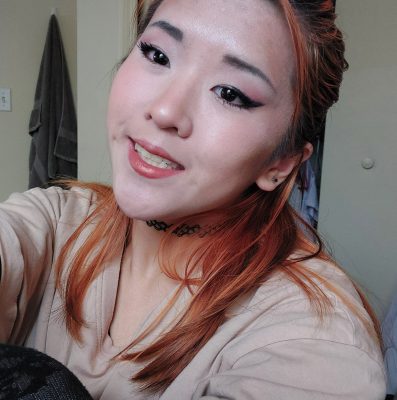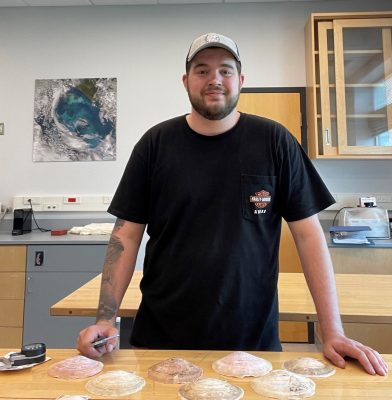By Judy Benson

Big challenges don’t scare Myalia Durno and Brendon Goulette.
This summer, after finishing the spring semesters at their respective colleges, Durno and Goulette will be delving into two of the most complex problems facing the marine environment.
Durno, 20, who attends the University of Hartford, will turn her attention to the issue of single-use plastics and obstacles restaurant owners along the coast face to using alternatives.
“So many people think there’s nothing that can be done about plastic pollution and climate change,” said Durno, who was adopted from China as an infant and grew up in northeastern Massachusetts. “But there are so many things that can be done to make a difference.”
Goulette, 27, a student at UConn Avery Point, is equally passionate about his project, which involves studying how climate change is impacting sea scallops, an important commercial fishery. Specifically, he’s focusing on a harmful parasite that’s becoming more prevalent with changing ocean chemistry and temperatures.

“I want to document the effects climate change is having on our fisheries,” said Goulette, who grew up in Windham and served in the Marine Corps before enrolling at UConn. “I’m trying to figure out how big of an issue (the parasite) might be and try to get ahead of it” before it becomes rampant in key areas that scallop fishermen from Connecticut and other New England states depend on.
The two students are the 2023 recipients of the Connecticut Sea Grant Undergraduate Research Fellowship, begun in 2020 to help increase diversity in marine science by offering summer research opportunities for underserved and underrepresented students. This includes students who are socioeconomically disadvantaged, students of color, indigenous students, students with disabilities, members of the LGBTQ community such as Durno, and veterans of the U.S. Armed Forces, such as Goulette.
The fellowship provides recipients with a $5,000 stipend to work under the supervision of a faculty mentor on a research project that aligns with CT Sea Grant’s strategic plan.
“We’ve received extremely positive feedback from former CTSG fellows,” said Syma Ebbin, CTSG research coordinator. “They appreciated having support to engage in summer research and also the opportunity to develop a close mentoring relationship with faculty and grad students. This year’s cohort of fellows include two students engaged in research relevant to Sea Grant’s mission. I am very excited to see what they accomplish.”
Both students have head starts on their summer research, having worked with other researchers and their advisors on related projects during the academic year.
Under Professor Katharine Owens, Durno was a research assistant helping collect data on single use plastics from restauranteurs in Hartford, Middletown and Glastonbury. For her summer project, she will continue the data collection in restaurants in coastal towns with Owens as her mentor-advisor.
With a major in psychology and a minor in environmental studies, the work fits perfectly into her future aspirations to do environmental policy and advocacy work that factors in human psychology.
“I couldn’t live my life without taking some sort of action on behalf of the environment,” she said.
Goulette, a marine sciences major, has been working for the past year under two marine sciences professors, Catherine Matassa and Samantha Siedlecki, to assist a doctoral student Halle Berger measuring scallop shells from a collection that dates to the 1980s. Through that work he became interested in diseases and parasites that affect scallops, and that turned into his summer research project, with Matassa, Siedlecki and Berger serving as mentor-advisors.
“This research project is of interest to me because I am passionate about understanding the effects of climate change on coastal fisheries,” he wrote in his fellowship application. “I am particularly interested in how coastal fishing communities are adapting to the changes occurring in their industry.”
The fellowship is a successful means of carrying out Connecticut Sea Grant’s workforce development goals while helping improve diversity in marine sciences, said Nancy Balcom, CTSG associate director.
“We are pleased to continue providing this professional development opportunity that enables students to refine their interest in science while working under the direction of enthusiastic, quality faculty mentors,” she said.
Judy Benson is the communications coordinator of Connecticut Sea Grant.